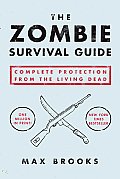When I first cracked Max Brooks’s Zombie Survival Guide, I didn’t expect to like it. I was reading, watching, and playing every zombie-related thing I could get my hands on at the time. It was for an assignment at first, but it became a full-blown obsession after I found the Walking Dead books and Shaun of the Dead came out. I was hooked on the monsters. But any book shelved in the humor section with “guide” in the title tended to be pretty mirthless, cookie-cutter stuff, especially if it addressed a trend. Working in a bookstore at the time made me even more skeptical. I had told one of our book reps about my zombie indulgence, and he gave me a copy of The Zombie Survival Guide to read.
It only took a few pages, and a gander at the table of contents, for me to start to change my mind. Brooks wrote earnestly with the type of detail one would expect from someone who had actually survived a zombie outbreak. He started with a description of Solanum, the zombie virus, and how long it took for the infection to take hold and reanimate a corpse. There were sections on zombie defense, weapons for close combat versus picking zombie off from a distance, and how to get your group to a safer place. A sample tip – if you have to hole up somewhere, make it a place where you can easily destroy the stairs so the zombies can’t get to you on the second floor. At the time I read the Guide, my wife Melissa and I were searching for our first home, and I actually assessed different homes by their zombie defense properties as set forth in the book.
So when that same book rep told me Brooks was going to release a novel, I was excited but a bit skeptical again. The Guide had been fantastic, but it wasn’t a narrative work. There was no guarantee the writing skills that allowed Brooks to write such a convincing Zombie Survival Guide would transfer to a work of fiction.
 I needn’t have worried. When my advance reader’s edition of World War Z:An Oral History of the Zombie War arrived, I devoured it. I loved everything about it, starting with the sticker on the front that promised it was “The best account of the war to date,” attributed to the Washington Post. Brooks was raising his game. This was an oral account of a zombie war, meaning the war would have to be over from the beginning, and it would be clear from the start humans had survived and managed to better the flesh-hungry menace. That took a big dose of suspense out of the story, the kind of suspense that drives most zombie stories. These people are all talking now, so they must have survived.
I needn’t have worried. When my advance reader’s edition of World War Z:An Oral History of the Zombie War arrived, I devoured it. I loved everything about it, starting with the sticker on the front that promised it was “The best account of the war to date,” attributed to the Washington Post. Brooks was raising his game. This was an oral account of a zombie war, meaning the war would have to be over from the beginning, and it would be clear from the start humans had survived and managed to better the flesh-hungry menace. That took a big dose of suspense out of the story, the kind of suspense that drives most zombie stories. These people are all talking now, so they must have survived.
Again, Brooks took an earnest tone with his narrator and other characters. Again, he took for granted that zombies were real, and that you believed it just as much as he did. In his world, there is no doubt – zombies are just a fact of life. So he starts with the first outbreak in China and shows how the virus spread worldwide, and how, theoretically, it was stopped by humans eventually. World War Z covers a lot of ground, from addressing dishonest drug companies trying to profit from the hysteria to divers trying to clear the oceans of bodies to prevent a new outbreak. It feels like a historical document.
The movie didn’t come close to the impact of the book. How could it? To do it properly, it would have to be shot as a documentary with long list of characters, and that is a lot less bankable on the big screen than an action movie. So Instead of getting the points of view of different people across the globe, they made one character travel around and fight the outbreak. It doesn’t capture the scale evident in the book. Most likely, the upcoming sequel won’t, either, if it manages to get off the ground. The book is the best way to experience this story. Certainly the most complete.
